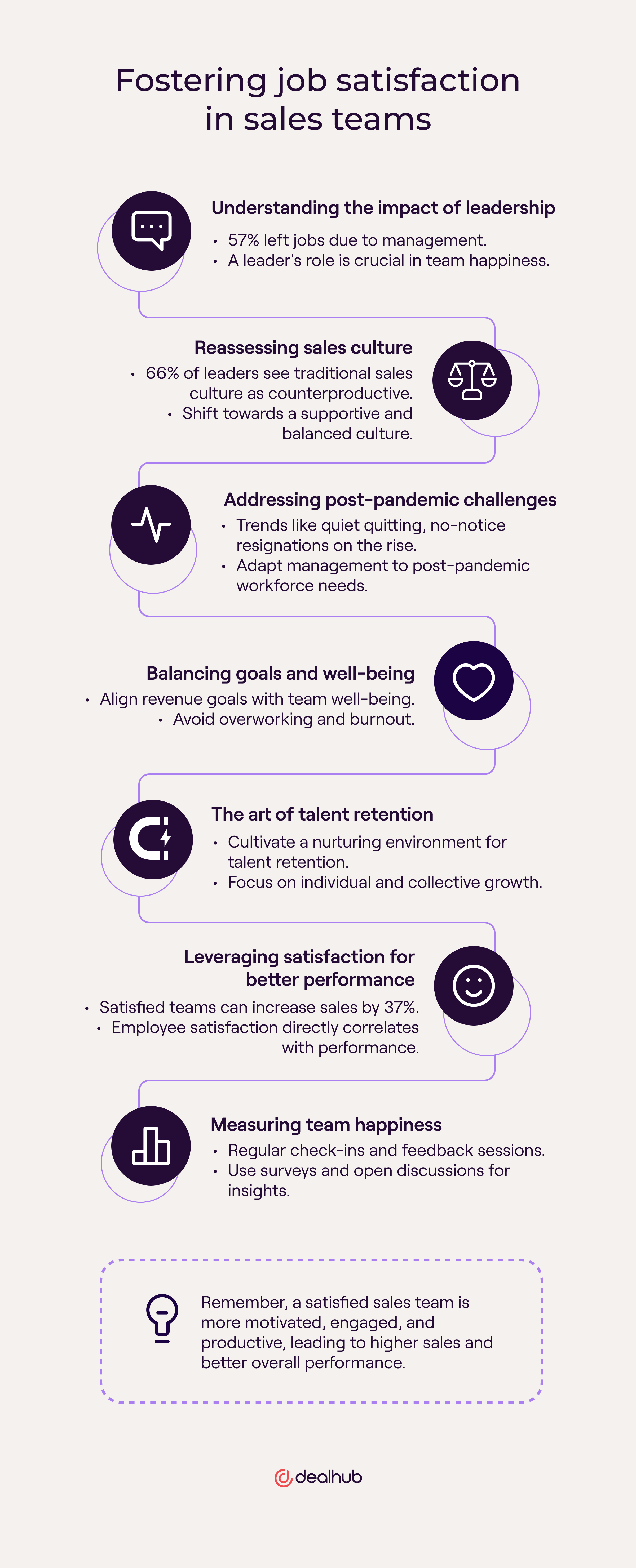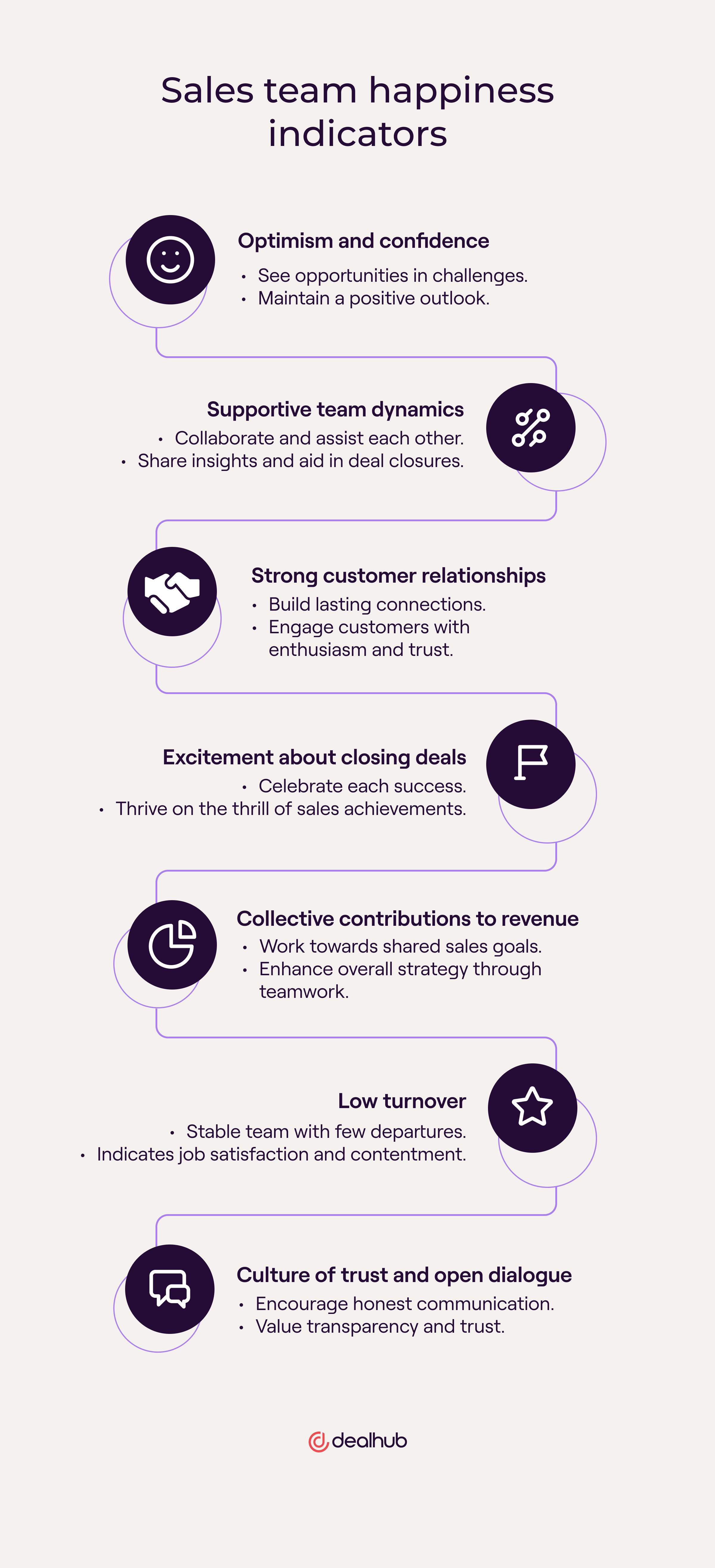A content and motivated sales force can quickly drive a company’s growth and profitability. After all, when sales professionals are happy, they perform at their best, forging stronger customer relationships, closing deals enthusiastically, and contributing significantly to revenue generation. However, when they are not satisfied with their role, sales can suffer, and companies may witness a higher turnover. Therefore, to encourage success in sales, businesses must prioritize their sales teams’ well-being. By recognizing and addressing the needs of your sales force, you can unlock their full potential and, in turn, pave the way for your company’s triumph.
Is your sales team living up to its potential? Today, we look at the 7 signs of a happy team, explore what makes themsales teams happy, and howteach you canhow to promote a culture of happiness in your own team.
The importance of job satisfaction in sales

Think about this when considering your role in fostering satisfaction among sales representatives:
- 57% of workers have left a job because of a manager
- 66% of sales leaders consider traditional sales culture counterproductive to fostering sales team happiness
Post-pandemic, many companies also saw a rise in trends like quiet quitting, no-notice resignations, and internal conflicts as employees faced burnout, a return to the office, and increased levels of stress that took a toll in team productivity.
Managing a high-performing team requires sales leaders to walk a fine line. They need to balance a company’s revenue goals but also take into account the well-being of each individual team member. If they fail to deliver, they risk losing talent while underdelivering on revenue projections.
That’s why, as a sales leader, it’s essential to find ways to retain talent. To do that, you must build a culture that will nurture a sales team’s win rates. And while, statistically, it seems like quite a challenge to retain a talented salesforce, putting in the effort can pay dividends for sales managers. For example:
- The top 10% of companies ranked by employee satisfaction outperformed those ranked in the bottom 10% by 2.3% to 3.8%.
- Building a team of contented salespeople can raise sales rates by 37%
When there’s so much upside to keeping your teams happy, how do you begin to measure your team’s happiness quotient?
Is your sales team happy?
Measuring happiness in sales is more holistic than measuring the amount of revenue generated by your sales team. While high numbers may translate to high success rates, they don’t necessarily mean high levels of contentment on the job. However, sales managers can measure their sales team’s overall happiness in numerous ways.

The 7 signs of a happy, engaged sales team include:
- Optimism and confidence. Happy sales teams exude optimism and confidence. They approach challenges with a can-do attitude, seeing opportunities where others might see obstacles.
- Ongoing support from team members. In a thriving sales team, members support each other. Collaboration is not just encouraged; it’s ingrained in the team culture. Whether sharing insights or assisting in closing a deal, a supportive team is a happy one.
- Strong customer relationships. Happy sales professionals go beyond transactions; they build lasting relationships with customers. Their enthusiasm is contagious, fostering trust and loyalty.
- Excitement about closing deals. A palpable excitement surrounds deal closures in a happy sales team. The thrill of success drives them, turning each closed deal into a celebration.
- Collective contributions to revenue generation. Beyond individual targets, happy sales teams understand the collective impact on revenue. They actively contribute ideas and efforts to enhance the overall sales strategy.
- Low turnover. A low turnover rate is a clear sign of contentment. Happy salespeople are less likely to seek opportunities elsewhere, reducing recruitment costs and promoting stability.
- A culture of trust and open dialogue. Open communication is the cornerstone of a happy team. When team members feel heard and valued, it fosters a culture of trust and transparency.
Happy sales teams are motivated and inspired
A big part of sales is about handling rejection. Consider this: most sales representatives experience a close rate of around 15%. That’s an 85% rejection rate! The level of optimism and job satisfaction must remain high for a salesperson to be able to repeatedly engage customers with enthusiasm. However, the daily grind can quickly become too much for even seasoned sales stars, so it’s essential to check in and ensure you’re creating an environment where teams can thrive.
Motivation is the fuel that propels a sales team towards success. It’s not just about encouraging the hitting of targets; it’s about creating an environment within the company where individuals are inspired to perform at their best.
You can foster a company culture rich in inspiration and motivation in several ways:
Setting attainable goals. Unrealistic goals can lead to frustration. Happy teams collaborate to set goals that challenge without overwhelming, ensuring a sense of accomplishment with each success.
Celebrating individual and team wins. Recognition is a powerful motivator. Celebrating individual and team successes creates a positive atmosphere, encouraging continued excellence.
Building an optimistic sales culture. Positivity is infectious. Leaders who cultivate an optimistic culture inspire their teams to approach challenges with resilience and creativity.
Fostering a collaborative environment. Collaboration between Sales Development Representatives (SDRs) and Account Executives (AEs) and across revenue operations functions (sales, marketing, and customer success) enhances the overall effectiveness of the team.
Streamlining sales processes. Efficiency is critical to motivation. Streamlining sales processes reduces frustration and empowers the team to focus on what they do best—closing deals.
Enabling wins with technology. Equipping your team with the right tools amplifies their capabilities. Technology streamlines tasks, allowing sales professionals to spend more time on value-adding activities. Look for technology that can streamline sales processes, including:
- CPQ and billing platforms for faster deal closing/invoicing
- eSign solutions to make signing contracts seamless
- CRMs for managing customer relationships
- Communication platforms to so teams can share insights internally
Offering training and career development. Investing in the growth of your team pays dividends. Continuous training and development opportunities enhance skills and show a commitment to their professional growth. This helps individuals feel valued and helps companies retain valuable assets.
Removing roadblocks to success. Identify and eliminate barriers that hinder productivity. Whether it’s outdated processes or inadequate resources, a proactive approach to problem-solving keeps the team motivated.
Supporting everyone’s well-being. A holistic approach to well-being includes work-life balance, mental health support, and a culture that values the overall health of team members.
Everyone benefits from a happy sales team
The ripple effects of a happy and motivated sales team extend far beyond individual and team achievements. Positivity within a sales team reverberates throughout the company in astounding ways.
For example, happy sales teams are inherently more productive (13% more productive, in fact!). Their positive mindset translates into efficient work, allowing them to accomplish more in less time. Low turnover rates are also a testament to a thriving work environment. While the average churn rate for employees is 10%, sales team churn can be as high as 35%. Sales managers can mitigate this level of churn by ensuring their team remains satisfied. After all, a stable team contributes to consistent performance and long-term success.
A content sales team also reflects positively on your brand. Satisfied employees become brand advocates, attracting top talent and enhancing your reputation in the industry. Happy salespeople provide better customer experiences as well. Their enthusiasm and commitment translate into stronger relationships and satisfied clients. If your company practices a customer-centric approach to sales, having happy, optimistic salespeople build the relationships that will be crucial to long-term customer satisfaction.
When sales teams are happier, they close more deals. Their passion and belief in the product or service resonates with customers, increasing the likelihood of successful transactions. Promoting a happy team culture cultivates positivity throughout the organization – from sales to marketing to customer success. This positivity fosters creativity, collaboration, and a commitment to increasing customer satisfaction and revenue.
Encouraging a culture of contentment throughout the year
It’s always important to reflect on your sales team’s well-being. Use the insights shared here to encourage a culture of contentment in order to set the stage for year-round sales success. By prioritizing job satisfaction, fostering motivation, and reaping the benefits of a satisfied sales team, you pave the way for sustained excellence. Your sales team is not just a workforce – they are the architects of your success. Ensure their happiness, and watch your company reach your revenue potential in the year ahead.




